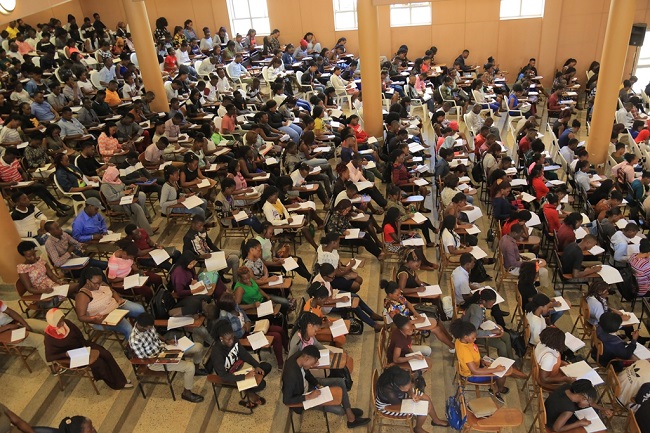On 30th August 2019, Makerere University hosted the 5th LEAP Conference. Held at CTF 2 Auditorium, College of Business and Management Sciences, the conference engaged students from various universities in Uganda in an inspirational conversation and debate on enhancing entrepreneurship skills among youth.
The LEAP Conference is a students’ initiative designed to highlight the experiences of global leaders who have taken a leap of confidence and driven change throughout the world. Every year, students from all respective Universities in Uganda participate in this unforgettable event, which empowers them to explore thought-provoking topics and participate in both interactive workshops and networking activities.

According to Mr. Dennis Aguma the Founder of LEAP-Uganda, through Conference engagements and workshops, students are primed to become the next generation of game changers, ready to fight off the discomfort that might have held them back from setting the world ablaze.
The 5th LEAP Conference (2019) was officially opened by Dr. Peter Ngategize, the National Coordinator of Private Sector Development Unit (MOFPED). This year’s Conference was organized by Makerere University College of Business and Management Sciences (CoBAMS) together with the National Association of Student Enterprises (nase), and the Innovation Village under the theme; Entrepreneurial Bridging: The Youth in the 4th Industrial Revolution.
Remising on the day’s theme, Dr. Ngategize urged students to streamline their entrepreneurship ideas to meet the demands of the 4th industrial revolution era. He advised students to work hard towards the success and growth of their business ideas.
“Be creative and innovative, discover your passion, and attain basic training in order to get skills. With the ever changing world, we also need to be rational in business idea development and with the 4th industrial revolution, we expect an idea that accommodates changes such as technology,” he said.

According to Dr. Ngategize any successful entrepreneur knows that taking risks and exploring new opportunities are often accompanied by a feeling of uncertainty. Drawing from his own experience, he explained to students how welcoming discomfort with open arms has allowed him to achieve his goals and make an impact on the world.
“That feeling of discomfort can make or break you; success can depend on how you handle it. In order to drive change and make an impact on the world around us, we cannot avoid discomfort; we have to embrace it,” he said.
He condemned the spirit of extravagance which has sprouted among the youth and guided them on how to make good use of their money by spending it profitably through setting income generating activities.

Representing the keynote Speaker, Hon Frank Tumwebaze- the Minister of Information and Communication Technology and National Guidance, Mr. Ocero Michael-the Assistant Commissioner Information Technology recognized the role of entrepreneurship and innovation in creating a knowledge based economy in a competitive world. He appreciated the skills and agility of the young entrepreneurs and advised them to move beyond invention to practical solutions that alleviate societal problems.
“The value of your creation will be measured from the extent of its useful impact,” he said.
Mr. Ocero applauded the President of the Republic of Uganda H.E Yoweri Kaguta Museveni for being open to multidisciplinary governance and also, for supporting the ecosystem for ICT Research, Innovation Development, Translation and Commercialization.

He called upon all academic institutions to strategies in promoting key skills required for competency including cognitive, technical problem solving, creativity, work ethics and managerial skills for entrepreneurs. In the same spirit, he urged entrepreneurs to be cognizant of the unique needs of the population, diverse languages and ethical concerns in Uganda.
The Dean School of Business, Dr. Godfrey Akilenge urged Makerere University students to take advantage of the Entrepreneurship and Innovation Center that has been established by the College through the Department of Marketing and Management to nurture and grow their business ideas.

“The Entrepreneurship and Innovation Center provides mentorship and space for young people to start and nurture business ideas. It also gives us more flexibility in doing other activities such as research and outreach as well as raising financial resources for our activities,” he stated.
Dr. Peter K. Turyakira, the Head of Department Marketing and Management revealed that the LEAP Conference is one way of preparing the entrepreneurship students for the forthcoming Makerere Entrepreneurship Expo.
He thanked the organizers for extending an opportunity to Makerere University to host the 5th LEAP Conference and encouraged students to make good use of the knowledge attained in the conference to develop business ideas.

The function was further enriched by a Panel discussion on the Congruence between Incubation and Entrepreneurship Education. The panel discussants included;
- Ms. Rose Tuwine a founder of Echo stoves which was started with the aim of conserving the environment currently employing over 200 workers.
- Lyne Tukei the Public Relations Officer of Xente Tech, a mobile App that can be used to buy products and commodities online, make bill payments among others.
- Ms. Nansuuna of Tukole a company building a community of service providers, through training them and later recommends them to other companies for jobs.
-
Article by Kanyi Rachael, Volunteer Mak Public Relations Office


 General16 hours ago
General16 hours ago
 General15 hours ago
General15 hours ago
 Humanities & Social Sciences2 weeks ago
Humanities & Social Sciences2 weeks ago
 General1 week ago
General1 week ago
 Agriculture & Environment2 weeks ago
Agriculture & Environment2 weeks ago








